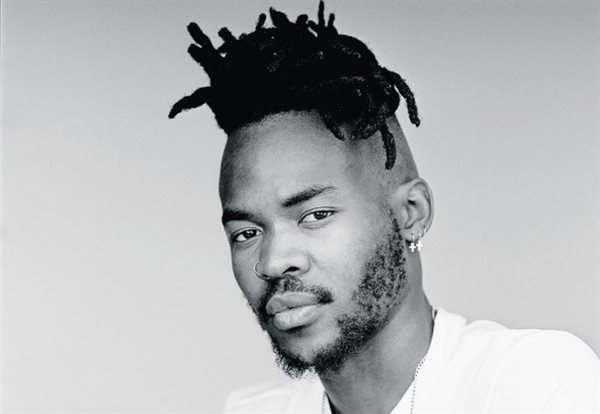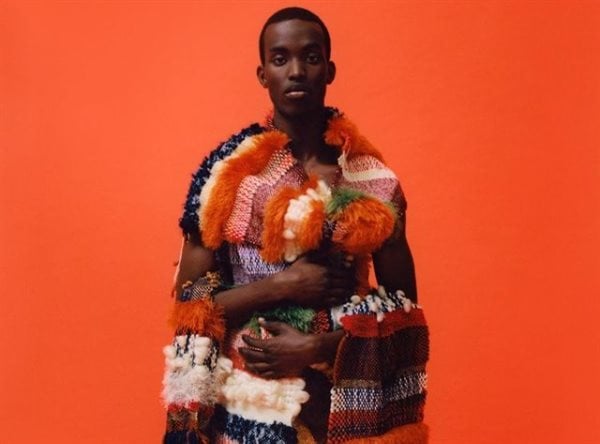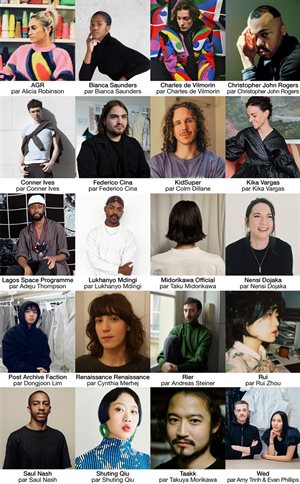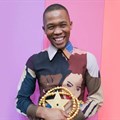Cape Town-based Lukhanyo Mdingi is among the 20 fashion designers from around the globe selected as semi-finalists for the 2021 LVMH Prize for Young Fashion Designers. The global competition is now in its eighth year, having been launched by luxury fashion conglomerate LVMH in 2013 to support and honour young design talent.

Lukhanyo Mdingi
South Africa has been well-represented in the competition previously, with local designer Thebe Magugu winning the 2019 LVMH Prize – the first African to do so. This year, local womenswear and menswear designer Mdingi is in the running for the top spot, alongside fellow African designer Adeju Thompson, who's behind the Nigerian fashion brand Lagos Space Programme.
SA's Mdingi scooped the Innovative Design and Materials Award at the local Twyg Sustainable Fashion Awards in 2019, recognising the designer's innovative use of sustainable textiles and clever garment construction.

Lukhanyo Mdingi's Coutts Collection. Credit: Lukhanyo Mdingi via Instagram
Prizes and judging process
The winner of the LVMH Prize for Young Fashion Designers receives a €300,000 endowment and benefits from a one-year bespoke mentorship programme provided by a dedicated LVMH team. The Karl Lagerfeld/Special Jury Prize rewards a young designer with €150,000 and a mentorship programme.
In addition, the Prize distinguishes three young fashion-school graduates who have completed their studies in 2020 or 2021 by allocating them, as well as their school, a €10,000 grant. The prize-winning graduates will join the creative studio of an LVMH Group House for one year.
This year's edition attracted over 1,900 candidates worldwide, with 20 young brands and their designers selected for the semi-final.
These semi-finalists come from South Africa, China, France, Italy, Japan, Lebanon, Nigeria, South Korea, the United Kingdom, the United States, and, for the first time, from Albania and Colombia.
This year, as a result of the restrictions imposed by the pandemic, the LVMH Prize has set up a digital platform.
From 6 April to 11 April 2021, the 20 semi-finalists competing this year for the final of the LVMH Prize will be showcased on the dedicated website lvmhprize.com, featuring their collections, their creative world and their personalities.
The 2021 edition will also allow the public to discover the semi-finalists and to vote for their favourite candidate.
20 brands selected for semi-final
• AGR, a British womenswear brand based in the United Kingdom, designed by Alicia Robinson, 30
• Bianca Saunders, a British menswear brand based in the United Kingdom, designed by Bianca Saunders, 28
• Charles de Vilmorin, a French genderless brand based in France, designed by Charles de Vilmorin, 25
• Christopher John Rogers, an American womenswear brand based in the United States, designed by Christopher John Rogers, 28
• Conner Ives, an American womenswear brand based in the United Kingdom, designed by Conner Ives, 25
• Federico Cina, an Italian genderless brand based in Italy, designed by Frederico Cina, 27
• KidSuper, an American menswear brand based in the United States, designed by Colm Dillane, 30
• Kika Vargas, a Columbian womenswear brand based in Columbia, designed by Kika Vargas, 38
• Lagos Space Programme, a Nigerian genderless brand based in Nigeria, designed by Adeju Thompson, 30
• Lukhanyo Mdingi, a South African womenswear and menswear brand based in South Africa, designed by Lukhanyo Mdingi, 29
• Midorikawa Official, a Japanese genderless brand based in Japan, designed by Tadu Midorikawa, 39
• Nensi Dojaka, an Albanian womenswear brand based in the United Kingdom, designed by Nensi Dojaka, 28
• Post Archive Faction, a Korean menswear brand based in South Korea, designed by Dongjoon Lim, 29
• Renaissance Renaissance, a Lebanese womenswear brand based in Lebanon and France, designed by Cynthia Mehrej, 32
• Rier, an Italian genderless brand based in France, designed by Andreas Steiner, 36
• Rui, a Chinese genderless brand based in China, designed by Rui Zhou, 27
• Saul Nash, a British menswear brand based in the United Kingdom, designed by Saul Nash, 31
• Shuting Qiu, a Chinese womenswear brand based in China, designed by Shuting Qiu, 27
• Taakk, a Japanese menswear brand based in Japan, designed by Takuya Morikawa, 39
• Wed, a British womenswear brand based in the United Kingdom, designed by Amy Trinh and Evan Phillips, both 30AGR, a British womenswear brand based in the United Kingdom, designed by Alicia Robinson, 30
Responsible approach to creative vision
Delphine Arnault from LVMH commented, “I am very grateful to all the candidates from more than 110 countries for taking part in this year’s competition and I would like to congratulate the semi-finalists. This semi-final will be entirely digital, and we wanted to open it to the greatest number of people: for the first time, the LVMH Prize will give the public the opportunity to discover the twenty semi-finalists on the lvmhprize.com website and to vote for the candidate of their choice.
"All the semi-finalists have incorporated a responsible stance in their creative vision: use of innovative or traditional materials, upcycling, recycled fibres, artisanal and local approaches. These initiatives echo the shift in the fashion and luxury industries. Among the semi-finalists, seven do womenswear, five menswear, and two do both womenswear and menswear. Six of them design genderless collections.
"This edition also saw the return of knitwear, body-conscious garments and the celebration of colour among certain designers. I am also delighted to welcome Naomi Osaka, a committed and outstanding tennis champion, the ambassador of this edition who will accompany us to the final.
"Finally, five inspiring personalities have joined our prestigious Committee of Experts this year: Bella Hadid, model; Samira Nasr, editor-in-chief of Harper’s Bazaar US; Léa Seydoux, actress; Aleksandra Woroniecka, fashion director of Vogue Paris; Margaret Zhang, editor-in-chief of Vogue China. All this promises a very rich and exciting 2021 edition.”
The date of the final and announcement is still to be confirmed.




































